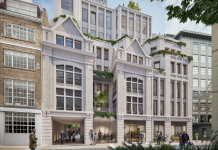Savills has released its latest monthly report looking at the City occupational markets:
Take-up for September reached 592,052 sq ft across 31 deals, resulting in the total for the year reaching 4.6m sq ft, which is down on this point last year by 14%. However, this is in-line with the 10-year average to the end of Q3. This brings the 12-month rolling total to 6.9m sq ft, of which 80% has been of a grade A standard, compared with the long-term average of 67%.
Of the 4.6m sq ft of take-up so far, the majority (62%) has been within the Core, with the Northern & Eastern Fringe, Midtown and Southbank accounting for 26%, 9% and 4% respectively.
Last month saw another deal at TwentyTwo Bishopsgate, EC2 when Nasdaq acquired level 18 (24,875 sq ft) at £69.00/sq ft. They will be relocating from their current office at Woolgate Exchange, EC2 next year. Since the end of last month we have seen two further deals here with Verisk acquiring levels 27 and 28 (52,140 sq ft) and Canopius acquiring levels 29 and 30 (52,140 sq ft). There is currently circa 770,000 sq ft remaining in the building, however 216,000 sq ft of this has been confirmed as under-offer and both Apple and Salesforce are rumoured to be in negotiations for circa 100,000 sq ft each.
At the end of Q3, the Serviced Office Provider sector has accounted for the greatest proportion of take-up at 26%. There were nine deals to this sector in September alone, with WeWork accounting for four of them. There has been a lot of speculation surrounding the sustainability of WeWork following the failed IPO and the subsequent cash injection from SoftBank to stabilise the business. While they have been on a rapid expansion programme over the last few years, the impact to the market in the instance of the worst case scenario (walk away from all rental commitments) would still be fairly limited. For instance, at the current rate of demand, if we assume that no more supply is added to the market, there is currently 13 months worth of supply remaining.
If WeWork decide to walk away from all of their rental commitments in the City and the entirety of that space returned to the market (which is unlikely as other serviced office providers would likely acquire the space for their own management), this figure would increase to 18.5 months of supply. While this is a notable increase due to WeWork having committed to 2.7m sq ft of space in the City since 2014, the supply/demand balance still remains below the ‘over-supply’ mark of 20 months. Therefore, while it is extremely unlikely that something to this effect would happen, it is encouraging to know that the market is poised to absorb a shock of this nature.
Total City supply rose last month by 13.6% and currently stands at 7.5m sq ft, equating to a vacancy rate of 5.7%, which is up on this point last year by 30 bps, but still down on the long-term average by 90 bps. The increase in supply is primarily due to Q1 2020 completions being added in which included 770,000 sq ft at TwentyTwo Bishopsgate, EC2, 80,000 sq ft at 100 Liverpool Street, EC2, and 161,000 sq ft at 155 Bishopsgate, EC2 amongst others.
We have seen strong rental growth across the City so far this year, a function of the high levels of demand combined with the low supply. The prime rent has risen this year settling at £82.59/sq ft at the end of Q3, up on last year by 6.2% and the highest on record. Similarly, the average Grade A rent, currently at £65.22/sq ft, has risen on last year by 5.6% and also the highest on record.
Interestingly, for the first time ever, the average Grade A rent in the fringes (£65.51/sq ft) is actually higher than that of the core (£65.01/sq ft). This has been a result of a change in perception of the fringe locations, occupiers becoming increasingly footloose, and the lower vacancy rate in the fringes (4.4%) compared with the core (7.2%).





















